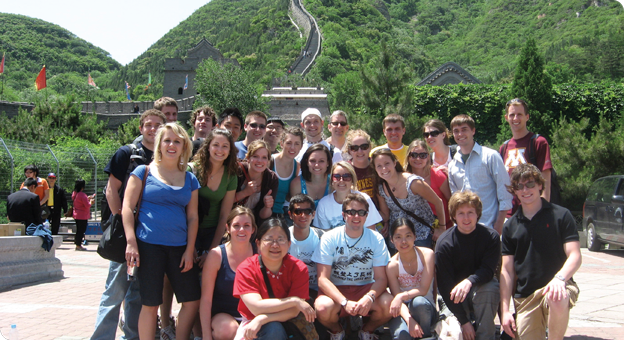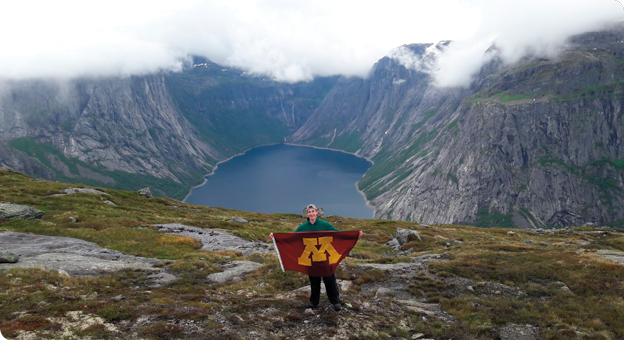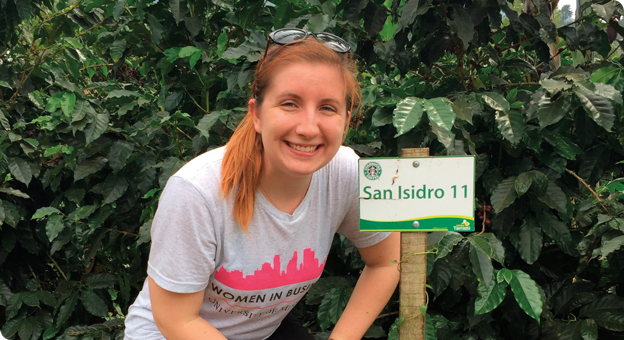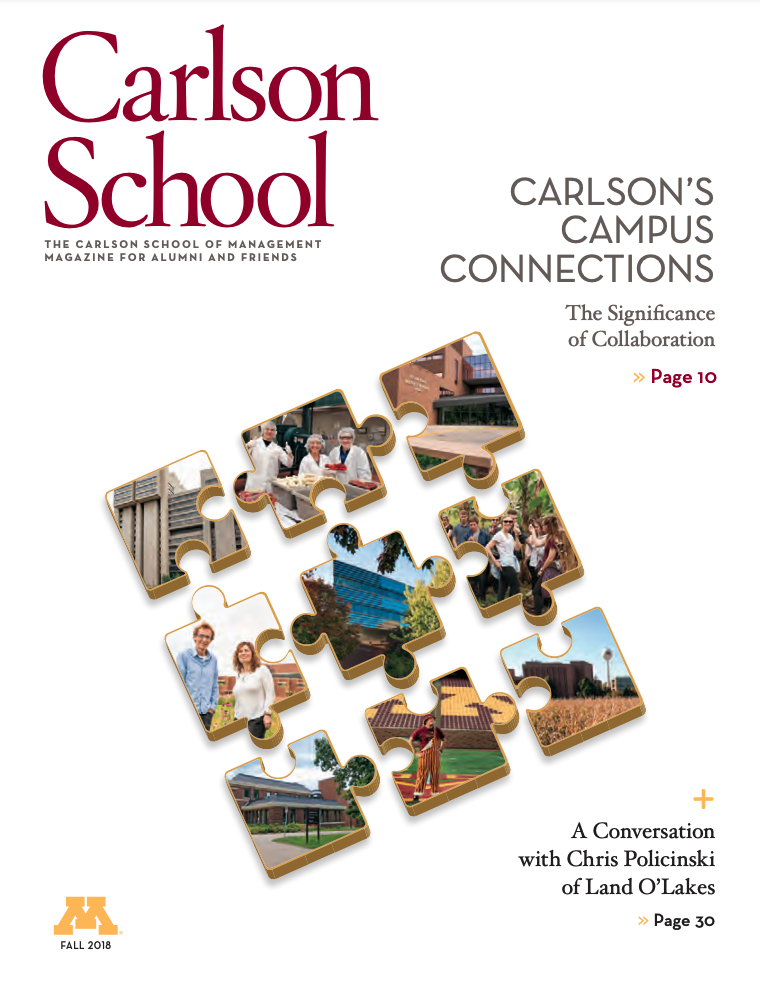
Global Learning: A Global Decade
Saturday, September 1, 2018
By Wade Rupard
After 10 years of having an international experience as an integral part of its curriculum, the Carlson School remains at the forefront of global education.
Great Brands All Have Great Signature Products
For Patrick McGinnis, ’03 MBA and vice president of merchandising at Best Buy, the Carlson School has one product that really makes it stand out from other top business schools—the Carlson International Experience.
“For me, the signature of a Carlson School degree is this international experience requirement,” says McGinnis, who chairs the Carlson Global Institute’s (CGI) Capital Campaign Committee. “It is something that is unique among business education programs out there, and it is very progressive. For me, it’s what stands out as being a key reason why students come to the Carlson School.”
This academic year marks 10 years since the Carlson School incorporated an international experience into the curriculum for all of its undergraduate students. To this day, this is one reason why the Carlson School stands out as a worldwide leader in global education.
And that leadership will continue into future decades thanks to a transformational $10 million donation from the Carlson Family Foundation this past July. This new investment in the Carlson School will help the school expand and enhance the work it does through CGI and help cement Carlson’s position as a leading business school with a global reach for years to come.
Today, more than 750 Carlson School students study internationally at top universities in nearly 40 countries around the world. These once-in-a-lifetime experiences have a profound impact on students and how they see business.
Now, CGI will build on the successful framework it has established. Since the expectation was established 10 years ago, CGI staff have worked tirelessly to forge strong partnerships both across campus and around the world. Because of this, CGI is poised to remain a leader in global education.
“We couldn’t do what we do without the current and past leadership at the school and University, benefactors, advisors, and other stakeholders,” says Michael Houston, associate dean of global initiatives and Ecolab-Pierson M. Grieve Chair in International Marketing. “What you see from the outside is only a fraction of what goes on throughout the year to make sure each student has an outstanding and rewarding international experience.”
A New Initiative
Upon her arrival as the new dean of the Carlson School in 2006, Alison Davis-Blake asked a group of external faculty to evaluate both the school as well its curriculum and programming. The group took a look at what the school did well along with opportunities for improvement.
One of the group’s major suggestions was that the Carlson School consider creating a program that distinguished itself from other top business schools in the country. This new initiative should emphasize the areas in which the Carlson School already excelled to help elevate the school’s visibility.
At the time, the Carlson School already had a strong education abroad program, with roughly 45 percent of its undergraduate students studying overseas and Executive MBA partnerships with schools in Poland, Austria, and China.
Davis-Blake, along with CGI leadership, worked together to make international education and global leadership that signature brand for the Carlson School. School leadership developed a plan to incorporate an international experience into the curriculum for all undergraduate students. With the business world becoming more global, this seemed like a clear opportunity to contribute to and leverage the assets of the school.
Today, under the leadership of Dean Sri Zaheer, the Carlson School’s international experience has become a resounding success, and one looked up to by peer institutions around the world. An early teacher in the Carlson Executive MBA-China Program, Zaheer has brought a global research and teaching perspective to the dean’s office. As dean, Zaheer has supported CGI and its mission fully and made education abroad scholarships a key priority of the Driven campaign.
Thanks to this and other initiatives, the U of M is among the top institutions in the country each year in sending students overseas, with Carlson School students making up a significant portion of that number. Moreover, the Carlson School welcomes international students from more than 30 partner business schools around the world.
CGI’s leadership in international education also helped assist the Association of Public and Land-grant Universities (APLU) to name the University as the inaugural winner of the Institutional Award for Global Learning, Research, and Engagement in 2016. The award recognizes institutions at the leading edge of inclusive and comprehensive efforts to internationalize their campuses.
“This is something that, to this day, remains unique among business schools,” Houston says. “I’m proud the Carlson School has been and remains a leader in international business education. But this milestone was not reached overnight. CGI has worked tirelessly since the international experience became official to forge strong partnerships both across campus and around the world.”
Finding Partnerships
The CGI staff soon determined there was no one-size-fits-all solution to providing international experiences. They continued to work with students individually to assure their readiness to travel and study abroad.
After the international experience came to be, the school expanded its already numerous global offerings. Along with the traditional semester-long study abroad courses, the school also offers Carlson faculty-led courses between semesters and during the summer, as well as independent studies for students to design their own program unique to their academic interest.
“No matter where they go or what they study, we want to make sure every student has a robust, transformative experience in a safe and unique way,” says Anne D’Angelo, assistant dean of global initiatives.
To accomplish this, CGI works closely with a wide array of stakeholders to ensure everything works smoothly. CGI in itself is unique because few business schools have a dedicated office focused on leading schoolwide global initiatives.
One example of this is the advising process. With plentiful options, it is important students understand all the different ways they can study abroad in order to meet their goals.
“When the requirement came to be, we immediately worked closely with our undergraduate academic advisors to make communication with students as seamless as possible,” D’Angelo says. “How do we ensure every student plans ahead and integrates the international experience into his or her own learning goals? Together we want to ensure that the experience is relevant for each and every student.”
Advising also has helped CGI provide the proper support for groups of students they didn’t originally consider, such as athletes, because of their oftentimes hectic schedule. Now, CGI staff works closely with athletes and coaches to ensure they take part in an experience that supports their extracurricular activities.
CGI also collaborates with corporate partners and the broader community in order to make these experiences robust and relevant to each and every student.
“It has been a widespread, meaningful collaboration across the Carlson School, the University, and the local and global community,” D’Angelo says. “We anticipated some things but we couldn’t see everything coming when you begin such a bold initiative.”
In the coming years, CGI will build on its partnerships and usher in more programs and initiatives that will continue to make the Carlson School one of the top business schools in the world.
Student Benefits
Everything CGI does works toward benefiting students. Because of the transformative international experiences they take part in, all Carlson School students are able to develop academically, personally, and professionally in ways they never thought were possible.
In 2017, CGI conducted a survey with alumni who graduated three, five, and 10 years ago to better understand connections between international education and their postgraduate professional experiences, as well as their intercultural motivations and abilities. In at least one job since graduation, 92 percent of respondents have worked with personnel whose backgrounds are culturally different from their own and 71 percent have worked on projects with an international component. Additionally, 76 percent of respondents are working virtually with people in another part of the world.
Britta Savre, a University Honors student who is a finance and HRIR double major, learned vital skills she will carry with her for years. While overseas, she took the class Sustainability and Corporate Social Responsibility in Costa Rica. That class opened her eyes to the importance of investing in projects and initiatives that benefit others.
“My study abroad experience influenced my future in many ways,” she says. “The first being that I am more open and ready for new experiences and am willing to be put somewhere that may make me uncomfortable. Also, I have a better understanding of sustainability and how it interacts with business. I hope to bring this knowledge into my future career and show the company I work for how important these sustainability concepts are.”
Skills that Savre acquired in her international experience are much sought after in today’s world. And those skills can be traced to that signature decision the Carlson School made 10 years ago.



